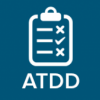test-driven development
 |
5 Steps to Get to Test Driven Development TDD is a software development approach in which a test is written before writing the code. When TDD is properly set up, it can bring numerous advantages and become a cost-saver, providing true value to the business. When TDD is not properly set up or without understanding how it should be used, it can be a waste of time and money. Quality comes not from inspection but from the improvement of the production process
|
|
 |
Teaching Acceptance Test-Driven Development Acceptance test-driven development is a whole-delivery cycle method that allows the entire team to define system behavior in specific terms before coding begins. These conversations align the expectations of the testers, developers, and product owners, forcing any silly arguments to happen before someone has to create the code twice. Here are some great beginner exercises for teaching ATDD.
|
|
 |
Shifting Testing Left Bakes In Quality from the Start “Shift left” is one of the latest buzz terms in software testing. Movements like agile and DevOps recommend that testers shift left, but what does that mean, exactly? Here's how one tester became a believer in the shift-left movement; how he got his team's developers, analysts, designers, and managers on board; and how his entire organization has benefited from the shift.
|
|
 |
3 Keys to Mastering Test-Driven Development From his decade of teaching thousands of professional software developers how to be effective with test-driven development, David Bernstein has learned that there are three key ingredients for mastering TDD: understanding what it really is, making code reliably testable, and getting hands-on experience. Let’s look at each of these factors to see what it takes to use TDD effectively on your projects.
|
|
 |
Using Agile and DevOps to Achieve Quality by Design When software nears completion, it is the wrong time to focus on quality. Product delivery improves if you invest in a plan, validate in small increments, and focus on continuous testing.
|
|
 |
Test-Driven Service Virtualization Because enterprise applications are highly interconnected, development in stages puts a strain on the implementation and execution of automated testing. Service virtualization can be introduced to validate work in progress while reducing the dependencies on components and third-party technologies still under development.
|
|
 |
Adopt an Innovative Quality Approach to Testing How much testing is really enough? Given resources, budget, and time, the goal of comprehensive testing seems impossible to achieve. It’s time to rethink your test strategy and start innovating.
|
|
 |
5 Ways to Pair Developers with Testers Some agile practices stress the importance of pairing team members together to achieve better team performance. Try these five suggestions for pairing key resources.
|
|
 |
Continuous Testing and Open Source Integration: An Interview with Alex Martins
Video
In this interview, Alex Martins, the CTO of continuous quality at CA Technologies, explains how continuous testing, continuous integration, and open source testing tools can help modern software teams keep up with the speed and demands of agile.
|
|
 |
STAREAST 2015 Interview with Hans Buwalda on the Challenges of Big Testing
Video
In this interview, Hans Buwalda discusses his STAREAST presentations. These include "When Testers Feel Left Out in the Cold" and "The Challenges of BIG Testing: Automation, Virtualization, Outsourcing, and More." He also covers his experience at the conference.
|
|
 |
STAREAST 2015 Interview with Dan North on Deliberate Testing in an Agile World
Video
In this interview, Dan North covers his presentations at STAREAST, including Deliberate Testing in an Agile World and Deliberate Discovery. He also discusses his experience at the conference and his multiple interactions with other testers.
|
|
 |
STAREAST 2015 Interview with Richard Hundhausen on Real-World Software Testing
Video
In this interview, Richard Hundhausen talks about real-world software testing, his experience at STAREAST, the benefits of Scrum and agile, and how we can end the developer/tester dichotomy by bringing these two teams together.
|
|
 |
Integration and Functional Testing Using Dockerized Dependencies
Slideshow
To emulate production-like conditions that cannot be tested on the unit level, many integration and functional tests need a realistic environment. However, performing these tests in a production-like environment is fraught with problems—test data management issues, tests that are difficult to execute repeatedly, and network traffic that causes long-running test execution times. Instead of having to deal with these problems and others, Irene Dhong employs Docker to simulate dependencies. Learn how you can take advantage of Dockerized dependencies for quick test writing, reusability of common development code, and the ability to test early and often on a very low functional level. Irene describes how her development team is using Docker to implement more effective TDD and unit testing environments because Docker utilizes similar infrastructure both on the development and DevOps side. Join in to get Dockerized, too.
|
Irene Dhong
|
 |
Test Data Management: A Healthcare Industry Case Study
Slideshow
As IT systems increase in both scale and complexity, delivering quality applications becomes more challenging. In addition to creating and executing test scenarios, testers need to create and maintain the test data that enables test execution. Test data management (TDM) creates and...
|
Jatinder Singh, Harvard Pilgrim Health Care, and Shaheer Mohammed, Harvard Pilgrim Health Care
|
 |
Blunders in Test Automation
Slideshow
In chess, the word blunder means a very bad move by someone who should know better. Even though functional test automation has been around for a long time, people still make some very bad moves and serious blunders. The most common misconception in automation is thinking that manual...
|
Dorothy Graham, Software Test Consultant
|
 |
Testing Blockbuster Games: Lessons for All Testers
Slideshow
We can all learn valuable lessons from game development where, in addition to functional performance, overall experiential quality—user experience (UX)—is of critical importance. Blockbuster game development presents particular challenges with regard to scale, rapid iteration, and fuzzy...
|
Tulay Tetiker McNally, BioWare Electronic Arts and Alex Lucas, BioWare Electronic Arts
|
Visit Our Other Communities
StickyMinds is a TechWell community.
Through conferences, training, consulting, and online resources, TechWell helps you develop and deliver great software every day.

